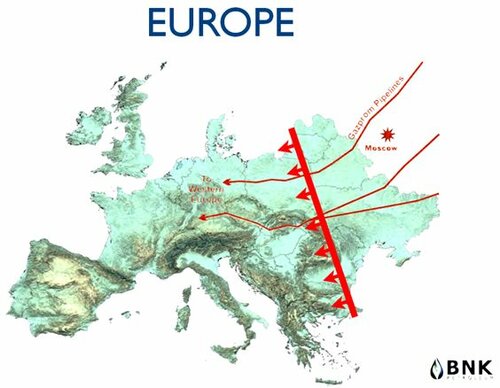The European Union summit which took place on May 22 is a landmark event and an important step further after the adoption of the 2009 Third Energy Package. The final document defines the core goals to be achieved by the European Union: keeping up with competition, improving employment and promoting economic growth. The European Council finds it necessary to use all political possibilities at its disposal while discussing energy and taxation. A wide range of accumulated problems makes it imperative to tackle these issues.
Top energy leaders, including the top managers of E.ON и RWE (Germany), GdF Suez (France), Eni (Italy), Ibedrola и Gas Natural Fenosa (Spain) (1) have approached the EU directly with a request to insert drastic changes into the Brussels policy to avoid collapse. The lingering economic crisis makes European leaders change the way the issue is tackled. The prime and ambitious goal is to enhance European competitiveness. It dovetails with a «re-industrialisation» agenda, which aims at a goal of a 20% industrial contribution to Europe’s gross domestic product by 2020 compared to 16 % at present. The European Commission came up with proposals on the ways to achieve the desired result in October 2012. (2) Industry leaders find it crucial to introduce drastic changes into the current energy policy. BusinessEurope is a European lobby which represents small, medium, and large companies through its members, 41 leading national business organisations in 35 European countries working together to achieve growth and competitiveness. It plays an influential role in Europe as the main horizontal business organisation at the EU level. Right before the summit Markus Beyrer, Director General of BusinessEurope, had formally addressed Enda Kenny, the Prime Minister of Ireland who currently heads the Council of Europe, in a letter putting blame for the weakness of European economy on inefficient environmental and renewable energy policy. (3)
Under the circumstances, ecology issues shift to the back burner of European energy policy. Holger Krahmer, a member of European parliament from German Free Democrat Party, noted that Europe’s plan to decarbonise its economy by 2050 could be turned on its head at a summit if EU heads of state and government sign off on measures prioritising industrial competitiveness over climate change. He hailed the end of «climate hysteria» in a press statement. (4)
The trend to shift focus from ecology had become evident before the event. For instance, in the middle of April 2013 the European Parliament rejected the Commissioner for Climate Action Connie Hedegaard's proposal for a new plan for the EU СО2 emissions trading system.
The resolute support of European structures for shale gas extraction strikes the eye. In December 2012 the European Parliament rejected a moratorium on fracturing proposed by the Greens parliamentary faction.
The decision was influenced by optimistic conclusions offered in a study devoted to the impact of hydraulic fracturing. According to the decision of the European Commission responsible for EU environmental policy, the report was prepared by a representative of Poland, a country set on accomplishing a super mission of achieving energy independence from Russia. The choice reflects the fact that the European Parliament wants to make fracturing be viewed as environment safe technology. Anne Glover (UK), the chief scientific adviser to European Commission President, says fracturing technology should not be banned in any event, she thinks any energy exploitation involves risks after all.
Only Connie Hedegaard, European Commissioner for Climate Action in the European Commission, spoke firmly against fracturing at the ceremony devoted to publication of Green Paper, A 2030 Framework for Climate and Energy Policies (March 2013). But she offers no coherent stance while the Commissioner for Energy and The President of the European Commission say shale gas extraction is a high road to European energy security. President of the Commission Jose Manuel Barroso warned that if the current trend continues, imports of gas would rise to 80% of the gas consumed in the EU by 2035. The supplies coming from Russia is still a major headache for EU leadership. The website of Canadian BNK offered an eloquent illustration to the point:

Source: http://www.bnkpetroleum.es/pdf/Current_Presentation.pdfh.7.
The publication of the management consultant A.T. Kearney’s report was evidently timed with the summit. The report said shale gas production in Europe is expected to come in full swing by 2017-2018. A.T. Kearney expects shale gas production in the region to reach 58 billion cubic meters by 2035, which is well over 12 percent of the total gas consumed by the EU in 2011. By that time the shale gas extraction in Europe should account for 45 percent of the total gas production in the region, with the exception of Norway.
According to our view, the report is built on sand. The producers and state geological services (5) are confident that no production estimates could be made without adequate exploration including actual drilling. As is known, the plans to produce shale gas by ExxonMobil (in Poland and Hungary), Shell (Sweden). have been shelved. In Germany Wintershall and BNK have called back their exploration licenses. BNK has dropped its concessions in Thuringia, Germany. Previously it had planned to produce 10 billion cubic meters annually during 25-30 years (the total country’s production is around 11 billion cm). (6) The forecast figures for overall European shale gas production were overestimated in the US Energy Information Administration 2011 report. We have the following picture making a comparison with the following national geological surveys (trillions of cubic meters): Germany 220 against 0, 7-2, 3, Lithuania 110 against 60-90, the Netherlands– 480 against 70-400, Poland– 5290 against 350 -1900 (7).
It’s hard to think the distortions are occasional. The United States of America comes in support of non-traditional fossil fuels production in Europe for geopolitical reasons. It wants Europe to reduce the dependence from Russia and the Middle East to promote the interests of US national drilling equipment manufacturers and shale gas producers.
One may assume that Wesley Clark, the co-chairman of Growth Energy, an ethanol lobbying group, and member of the board of BNK Petroleum directors, influenced the stance of Victor Ponta, the Prime Minister of Romania, who all of a sudden made an about-face becoming an ardent shale gas production supporter, something he had opposed before. (8)
The shale gas technology adopted in other countries is important for the United Sates as a matter of political prestige: the introduction of technology allowing the extraction of the resources inaccessible before promotes its image as a high-tech leader. At that, the established US experts are sure that shale production has future only in some European countries. (9) They view Poland as the prime candidate. The UK government is ready to provide active support for shale gas production in Great Britain. Besides, the exploration licenses have been granted by Austria, Germany, the Netherlands, Sweden and Spain. France has imposed a fracking ban, Bulgaria, Belgium and Ireland have imposed moratorium on shale gas extraction. In Austria OMV froze the exploration works started in March 2012.
Talking about the vision of the problem, the European countries boasting unconventional gas resources could be divided into three groups:
– geopolitics comes first – Poland and Great Britain;
– voters give priority to ecology – France, Germany and Austria;
– profits define the final decision – the Netherlands, Sweden, Ireland and Spain.
The East European countries (primarily Romania), that imposed moratorium on shale gas exploration under public pressure, are in limbo waiting for a signal from the European Union.
Herman Van Rompuy, the President of the European Council, said the summit was the «right moment for a strategic debate on European energy policy». He noted that «Europe will soon be the only continent dependent on imported energy». He also called for increased investment in energy infrastructure and efficiency in a bid to cut costs. (10) The wording is murky: article 194 of the Lisbon Treaty envisions a member state's right to determine the conditions for exploiting its energy resources, its choice between different energy sources and the general structure of its energy supply. The EU summit conclusions confirm the allegiance to this provision (p.6b).
Before the summit the European Union had expressed its interest in having American shale gas revolution be echoed in Europe, but the final document never mentioned the unconventional resource.
At that, Guenther Oettinger, the European Union's Energy Commissioner, who had taken a stand against amending EU standards to meet the advent of shale gas, calls now for setting common energy efficiency standards. The preparatory work is to start this year. (11) It’s not an occasion that shale gas is omitted from the summit’s final document; it’s a sign some countries oppose the plans of European Commission. For instance, Peter Altmaier, German Federal Minister for the Environment, said fracturing is not the technology to be used in Germany at present. (12) Patrick Doering, Secretary General of the German Free Democrats (FDP), has taken a stand against common European standards no matter his political party supports the shale gas production. (13)
The debates over shale gas demonstrate growing interest to economic aspects of European Union energy policy at the expense of ecology. The arguments of geopolitical agenda prevail.
There are instances of production companies walking out of projects promising no profits. It serves as a testimony to the fact that geopolitics defines the Brussels stance making pale other considerations. From this point of view, the affirmations that shale gas development will have a favorable impact on prices or employment appear to be pure populism. The goal of putting forward such arguments is to weaken the movement for environment protection, especially in view that more rigorous environmental standards will hike the prices.
The traditionally anti-Russian energy policy of the European Union gets a new content. Nothing proves that the European Union wants to lower the dependence on energy imports as such. For instance, at the very same time the possibility of gas imports from Ukraine in distant future is part of the agenda. What lies at the bottom of the European Union’s stance is finding the ways to become independent from Russia…









